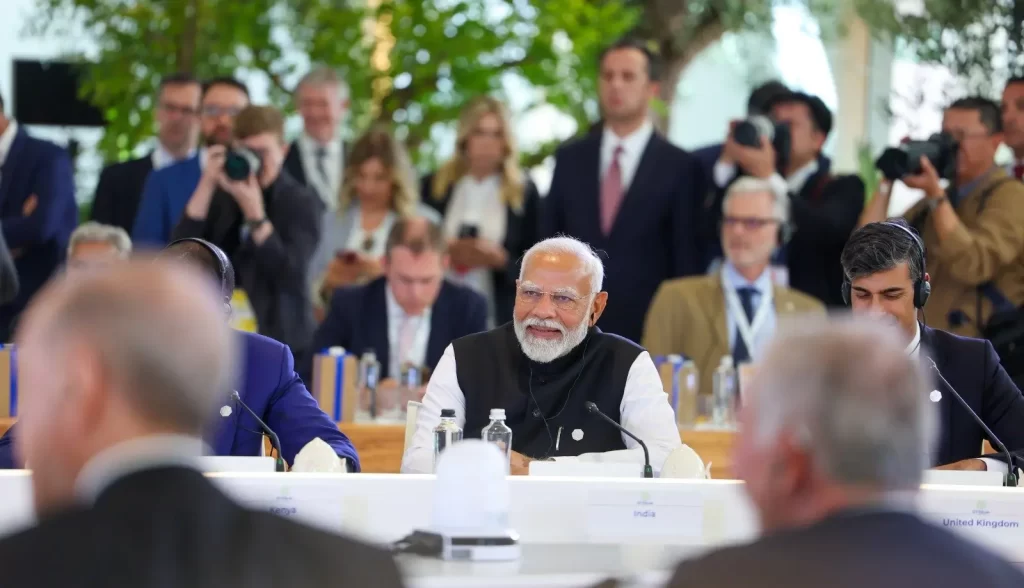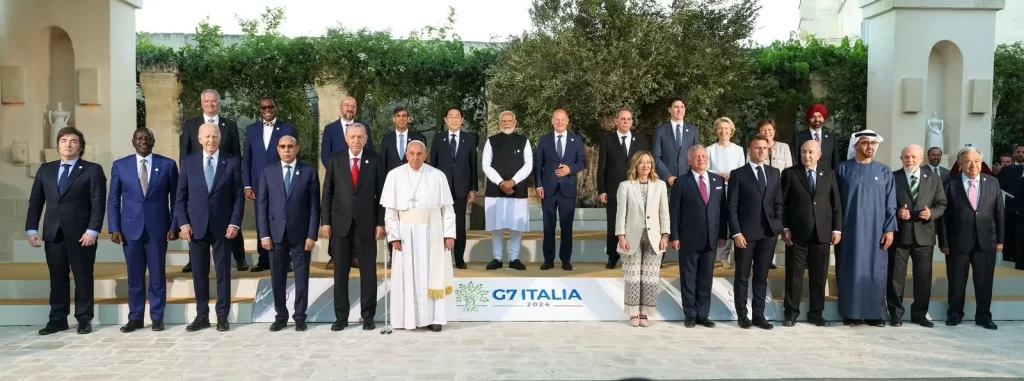In its third term, the foreign policy of the Narendra Modi govt is expected to remain consistent. However, adjustments may be made to the agenda regarding specific regions in response to changing global dynamics and India’s strategic interests.

During the swearing-in of the new government, leaders from seven neighboring countries including Bangladesh, Bhutan, Nepal, Sri Lanka, Maldives, Mauritius, and Seychelles were in attendance, highlighting India’s commitment to regional diplomacy. Notably, Pakistan, Afghanistan, and Myanmar were not extended invitations to the event. It’s worth noting that despite the presence of leaders from neighboring countries, there were no substantive bilateral meetings with any of them, suggesting a reserved and cautious approach towards immediate regional engagement.
Read Here: Uttar Pradesh Influence on Indian Prime Ministers | Political Role of UP
The geopolitical landscape in the Indian subcontinent demands agile diplomacy from India, particularly in its relations with neighboring countries. A unilateral display of generosity, without insistence on reciprocity, is poised to foster goodwill among these nations. Many of India’s neighbors express a desire for a poised and tactful approach from Prime Minister Modi in the third term of his leadership, as opposed to a heavy-handed New Delhi that frequently asserts its dominance.
India’s Modi Relationship With Pak
Regarding India’s relationship with Pakistan, the dynamics have been marked by significant fluctuations. In 2014, Prime Minister Modi extended invitations to the leaders of SAARC countries for his swearing-in ceremony, including the then-Prime Minister of Pakistan, Nawaz Sharif. Subsequently, the engagement between India and Pakistan witnessed turbulence, particularly following the terrorist attacks in Pathankot and Uri in 2016.
The year 2019 witnessed a spike in nationalist fervor in India following the Pulwama attack and the subsequent Balakot strikes, which notably contributed to the electoral success of the BJP. However, these events dealt a severe blow to India-Pakistan relations. The situation in Pakistan has since evolved, with significant political developments. Former Prime Minister Imran Khan, who held office in 2019, is now imprisoned, and the country’s economy is grappling with a profound crisis. Furthermore, the Sharif family, bolstered by support from the Army, has made a resurgence in political power. Notably, both Nawaz and his brother, Prime Minister Shehbaz Sharif, have extended messages conveying aspirations for hope and peace.
Indian Prime Minister Narendra Modi reiterated that India’s top priority is “security,” particularly in countering terrorism supported by Pakistan. For the past nine years, New Delhi has maintained the position that “terror and talks can’t go together.” The recent spate of terrorist attacks in the region of Jammu and Kashmir has effectively quashed any potential public support for engaging in talks with the adversary.
Regarding Afghanistan, diplomatic ties with Kabul have been nonexistent since the Taliban assumed power in August 2021. While there is limited engagement through a technical team focused on providing humanitarian aid, high-level interactions have been suspended for the time being. However, it is expected that some form of working relationship will persist.

Modi Relationship WithMaldives
In recent news, the visit of President Mohamed Muizzu to India has garnered significant attention. President Muizzu, who came to power with an “India Out” agenda, has shown a willingness to engage with India following the replacement of military personnel manning Indian air assets in the Maldives with trained technical personnel, as per the request of the Maldivian government. This move has been seen as a positive step towards renewing diplomatic relations between New Delhi and Malé.
Modi Relationship With Bangladesh
In the past, campaign rhetoric about “infiltrators” has strained relations with Bangladesh. It would be beneficial for members of the government and the ruling party during Modi 3.0 to exercise greater restraint in their rhetoric. Both sides share a common goal in countering extremism, radicalisation, and terrorism, so a more measured approach is likely to foster better relations and cooperation between the two countries.
Bhutan
India has expressed its willingness to provide support to Bhutan in implementing its five-year plan, offering a financial stimulus package and assistance with the Gelephu mindfulness city project. This commitment is significant, especially in light of China’s attempts to assert its influence in negotiating the border with Bhutan on its own terms. India’s support for Bhutan is driven by a desire to secure Bhutan’s alignment with its own interests, as the country finds itself positioned between the competing influences of the two Asian giants.
Nepal
The situation with Nepal is quite complex and sensitive. China has a significant influence in Nepal, and the government in Kathmandu, particularly under the leadership of former Prime Minister K P Sharma Oli, has been seen as cozying up to Beijing, potentially at the expense of its relationship with New Delhi. Recently, the decision to incorporate the unilaterally redrawn borders of Nepal on the national currency indicates that this dynamic may persist. India will need to make concerted efforts to regain the confidence of the Nepali people, especially after the fallout from the economic blockade of 2015.
Modi Relationship With Western Countries
The approach of the Modi government towards engaging with Western countries has been primarily based on seeking mutually beneficial transactions, marking a departure from the strategies employed by previous administrations. India has made significant strides in cultivating robust strategic relationships with the United States, European nations, Japan, and Australia.
During recent election campaigns, there was a notable outcry regarding perceived Western “interference,” which was triggered by criticisms of the Indian government in Western media. The Indian government’s assertive response underscored its acute sensitivity to Western commentary, even in the face of relatively innocuous remarks from Western governments. This sensitivity was evident in the issuance of démarches against friendly Western nations such as the US and Germany during the election period.
Read Here: Agnipath Scheme Sparks Widespread Opposition and Controversy Across India
India’s partnership with the US enjoys support across party lines and is anticipated to remain resilient regardless of the outcome of the November presidential elections. The future trajectory of the relationship is likely to be shaped by collaboration in defense and cutting-edge technologies.
United Kingdom and Canada
The United Kingdom has actively pursued stronger economic and political relations with European countries, specifically France and Germany. As part of this effort, the UK has expressed a strong interest in finalizing a Free Trade Agreement (FTA) with India. Similarly, India and the European Union are also eager to reach an FTA, aiming to foster mutual economic advantages.
An alleged scheme to assassinate Khalistani separatist Gurpatwant Singh Pannun has strained India’s relationship with the West, particularly as Western nations hold India in high regard for its commitment to democratic principles and the rule of law. The upcoming visit of US National Security Advisor Jake Sullivan presents an opportunity to gauge the resilience of Indo-US diplomatic ties and potentially pave the way for addressing this contentious matter.
Meanwhile, political relations with Canada have experienced a significant strain following Prime Minister Justin Trudeau’s accusation against India in connection with the assassination of another Khalistani separatist. It is anticipated that these strained ties may persist at least until the Canadian elections in 2025. Nevertheless, economic relations and the flow of students to Canada have not suffered as a result of the political tensions.
China & Russia
Over the past four years, India has been facing a standoff at its border with China. Prime Minister Modi’s current term, known as Modi 3.0, faces the complex and challenging task of resolving this ongoing issue. India’s stance has been clear: stability and normalcy cannot be achieved until the border situation is resolved. New Delhi is seeking complete disengagement followed by de-escalation, but the process of moving around 50,000-60,000 troops and weaponry away from both sides of the border is expected to be time-consuming. High-level diplomatic efforts, such as Prime Minister Modi’s anticipated meeting with President Xi Jinping in Kazakhstan during the SCO summit, are seen as potential opportunities to make progress towards a resolution.
India’s relationship with Russia is facing significant strain due to the ongoing war in Ukraine. The core of India’s dependence on Russia lies in defense requirements, but the recent availability of cheaper oil has also elevated energy to a key aspect of this relationship.
Despite facing Western sanctions, Russia has managed to withstand the pressure and is now perceived as having the upper hand in the conflict. As a result, India is likely to abstain from attending the upcoming peace conference in Switzerland on June 15-16 at the highest level due to Russia’s absence. However, India is expected to participate at an official level and will emphasize the importance of dialogue and diplomacy.
For a peaceful resolution, it is essential for both Russia and Ukraine to engage in negotiations. While India’s government under Modi 3.0 seeks to contribute to the peace process, it is also cautious about avoiding any harm to its own interests.







